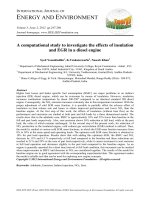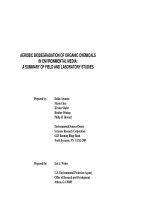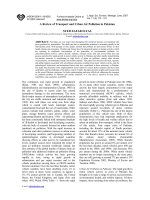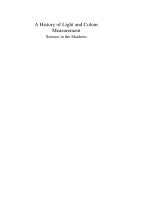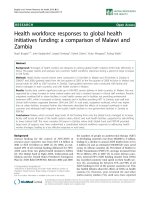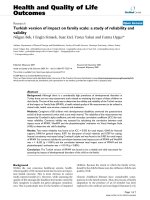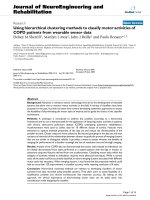- Trang chủ >>
- Khoa Học Tự Nhiên >>
- Vật lý
USING a NONLINEAR COUPLER TO SORT a SEQUENCE OF WEAK AND STRONG PULSES
Bạn đang xem bản rút gọn của tài liệu. Xem và tải ngay bản đầy đủ của tài liệu tại đây (133.98 KB, 6 trang )
Proc. Natl. Conf. Theor. Phys. 37 (2012), pp. 193-198
USING A NONLINEAR COUPLER
TO SORT A SEQUENCE OF WEAK AND STRONG
PULSES
HO QUANG QUY, VU NGOC SAU, NGUYEN THI THANH TAM
AMST, Vinh University, QuangNam University
and
CHU VAN BIEN
HongDuc University
Abstract. In this article, the dependence of power transfer coefficient of a
nonlinear coupler on its length and the input intensity is investigated and
discussed. The nonlinear threshold of the nonlinear coupler is determinated.
Based on that, the capacity to select the optical pulses is found out. The sorting
of a sequence of weak and strong pulses by the nonlinear coupler is simulated.
Key words: Optical fiber, Optical coupler, Kerr effect, Wave coupling.
I. INTRODUCTION
Normally the cores of both fibers of a coupler are linear (Fig.1a). In this
article, we consider the nonlinear coupler where the core of one of the fibers is
nonlinear Kerr medium, the other one is linear (Fig.1b).
Fig. 1. (a) Linear fiber coupler.
(b) Nonlinear fiber coupler.
As shown in some works [4, 6], the transfer percentage of coupler depends
on principle parameters as length of coupler, radius of fiber, and separate space
between them. When two waveguides are sufficiently close, light can be coupled
from one waveguide to the other [6, 11, 12]. A nonlinear direction coupler works
based on this principle. The refractive index and the dimensions of the waveguides
may be selected so that when the input optical power is low, it is channeled into
the other waveguide; when it is high the refractive index is altered in the nonlinear
material and the power remains in the same waveguide.
194 HO QUANG QUY, VU NGOC SAU, NGUYEN THI THANH TAM AND CHU VAN BIEN
In this paper we propose nonlinear fiber coupler (see Fig.1b). In Sec.2
from propagating equation of coupling waves [1, 6, 10], we introduce the equation describing the power transferring of nonlinear coupler and investigate the
dependence of power transfer coefficient of the nonlinear coupler on its length.
In Sec.3 we study on the dependence of the power transferring of nonlinear coupler on the input intensity. The nonlinear threshold of the nonlinear coupler is
determinated. In Sec.4 the sorting of the sequence of weak and strong pulses by
the nonlinear coupler is simulated and discussed.
II. POWER TRANSFERRING OF NONLINEAR COUPLER
From previous works [10], we have expressions for transferring power between fibers of the nonlinear coupler as follows:
2 c2 ǫ2 n4 I 4
4π
0 nl in
sin2 z
+ C 2 ,
4
2
4π 2 c2 ǫ20 n4nl Iin
16λ
2
+C
16λ2
2 c2 ǫ2 n4 I 4
4π
C2
P2 (z)
0 nl in
sin2 z
= 4π2 c2 ǫ2 n4 I 4
+ C 2 ,
1−η =
2
P1 (0)
16λ
0 nl in
2
+C
C2
P1 (z)
=1−
η=
P1 (0)
(1)
16λ2
where 1 − η and η is transfer coefficient of power from Kerr fiber to linear fiber
and to Kerr fiber, respectively; P1 (0), P1 (z) and P2 (z) are input optical power,
optical power of wave in Kerr fiber from port-1 and optical power of wave in linear
fiber from port-2, respectively; nnl is the nonlinear coefficient of refractive index
of Kerr fiber; C is coupling coefficient; Iin is input intensity; λ is wavelength; z
is the nonlinear coupler length.
Consider the nonlinear coupler C = 0.694/mm [6], nnl = 10−12 mm2 /W ,
the input light wavelength λ = 1.53µm and the input intensity Iin = 1, 4.1011
W/mm2 ; ǫ0 = 8, 854.10−12 F/m. From (1) we can see the power transfer coefficient is a periodical function of the nonlinear coupler length (see Fig. 2).
From Fig. 2 we can see corresponding to the input intensity Iin = 1, 4.1011
W/mm2 , the nonlinear coupler still reflect transferred characteristics of a linear
coupler, i.e. the power transfer coefficient have value from 0 to 1 for a period.
This does not occur in the nonlinear coupler. Lmax is the nonlinear coupler
length corresponding to the transfer coefficient of power from Kerr fiber into
linear fiber is about 100 percent. This thing is not occuring when input intensity
increases. In fact, when input intensity is high, Kerr effect strong, refractive index
in Kerr fiber increases quickly. So the reflection into the Kerr fiber is stronger
than into the linear fiber . The simulated result shows that when input intensity
Iin ≥ 1.5 × 1012 W/mm2 , the light power in the Kerr fiber cannot channel into
the linear fiber, it only transfer into the Kerr fiber (see Fig. 3).
USING A NONLINEAR COUPLER TO SORT A SEQUENCE OF WEAK...
195
Fig. 2. Periodical transfer of power (a) in Kerr fiber. (b) in Kerr fiber
is channeled into linear fiber of the nonlinear coupler.
Fig. 3. The power transfer coefficient when Iin ≥ 1.5 × 1012W/mm2 (a)
from output port-1. (b) from output port-2.
III. THE NONLINEAR THRESHOLD OF A NONLINEAR
COUPLER
For the nonlinear coupler with the following parameters: C = 0.694/mm
[6], nnl = 10−12 mm2 /W , ǫ0 = 8, 854.10−12 F/m, and the nonlinear coupler length
is long z = Lmax = 2.3mm, the dependence of the power transfer coefficient of the
nonlinear coupler on the input intensity at wavelength of λ = 1.53µm is plotted
in Fig. 4
Fig. 4 shows that, when input intensity Iin < 1, 4.1011 W/mm2 , the light power
in Kerr fiber almost is channeled into linear fiber . In this case, the power
transfer coefficient of the nonlinear coupler does not depend on input intensity.
That is characteristic of the linear coupler. When input intensity increases to
196 HO QUANG QUY, VU NGOC SAU, NGUYEN THI THANH TAM AND CHU VAN BIEN
Fig. 4. The power transfer coefficient when z = Lmax = 2.3mm, (a)
from output port-1. (b) from output port-2.
Iin > 1, 4.1011 W/mm2 , the Kerr effect occurs. Thus, a part of the light power
remains in the Kerr fiber. So, the first nonlinear threshold of the nonlinear coupler
is IT 1 = 1, 4.1011 W/mm2 .
When input intensity increases, the power transfer coefficient from Kerr
fiber into linear fiber decreases and the power transfer coefficient into the Kerr
fiber increases. When input intensity is high Iin > 1, 5.1012 W/mm2 , the light
power in Kerr fiber cannot transfer into linear waveguide, but into the Kerr fiber,
the power transfer coefficient in Kerr fiber is approximately 100 percent. Thus,
the second nonlinear threshold of the nonlinear coupler is IT 2 = 1, 5.1012 W/mm2 .
From these results, we can conclude that the nonlinear coupler can be
used not only as switching and performing logic operations, but also as sorting a
sequence of weak and strong pulses, separating them into the two output ports,
as illustrated in figure 5.
Fig. 5. The sorting of a sequence of weak and strong pulses.
USING A NONLINEAR COUPLER TO SORT A SEQUENCE OF WEAK...
197
IV. THE SORTING A SEQUENCE OF WEAK AND STRONG
PULSES BY THE NONLINEAR COUPLER
In the laser operation, a series of closed to Gaussian pulses with arbitrary
amplitude may appear. Mathematically, the dependence of laser intensity on
time can be approximately expressed in the form as
√
−
Iin (t) = (I0 + mkIm ) e
ln2(t−3T −7kT )
T
2
,
(2)
where I0 is the first amplitude of the series of Gaussian pulses, mIm is the modulating amplitude, m is random function, k is integer, T is the period of the series
of Gaussian pulses.
Numerically solving (2) by Mathematical software using typical parameters: I0 = 0.5 × 1011 W/mm2 , k = 0, 1, 2, 3, 4, 5, 6 and t/T is chosen arbitary, the
series of input Gaussian pulses are simulated and illustrated in Fig. 6.
Fig. 6. The series of input Gaussian pulses with arbitrary amplitude.
From equation (1) we have the output-input intensity relation as follows
2
2 c2 ǫ2 n4 I 4
4π
C
0 nl in
+ C 2 ,
Iout1 =Iin 1 − 4π2 c2 ǫ2 n4 I 4
sin2 z
2
16λ
0 nl in
2
+
C
16λ2
(3)
2
2 c2 ǫ2 n4 I 4
4π
C
0 nl in
sin2 z
Iout1 =Iin 4π2 c2 ǫ2 n4 I 4
+ C 2 .
2
16λ
0 nl in
2
+C
16λ2
Substituting (2) into (3) and using by Mathematical software for the nonlinear coupler, with typical parameters: C = 0.694/mm [6], nnl = 10−12 mm2 /W ,
ǫ0 = 8, 854.10−12 F/m, z = Lmax = 2.3mm, λ = 1.53µm and t/T is chosen arbitary, the series of output pulses from output port-1 and output port-2 are
simulated and illustrated in Fig. 7.
198 HO QUANG QUY, VU NGOC SAU, NGUYEN THI THANH TAM AND CHU VAN BIEN
Fig. 7. a) The series of strong output pulses from output port-1. b)
The series of weak output pulses from output port-2.
Though the peaks of input pulses change randomly causing by the random
function (see Fig. 6), but by the nonlinear coupler, from Fig.7 we can see that,
the input pulses with low peaks, Iin ≤ IT 1 = 1, 4.1011 W/mm2 , transfer into
linear fiber from output port-2; the input pulses having high peaks, Iin ≥ IT 2 =
1.5 × 1012 W/mm2 , remain in the Kerr fiber from output port-1.
V. CONCLUSION
In this report we have shown the dependence of the power transfer coefficient of a nonlinear coupler on the nonlinear coupler length is periodic and the
maximum length of nonlinear coupler Lmax is derived. We have obtaired the
dependence of the power transfer coefficient of a nonlinear coupler on the input
intensity, that allows to derive the nonlinear threshold of a nonlinear coupler.
The obtained results of simulation show that the nonlinear coupler can be used
not only to switch and to perform as a logic gate but also to sort a sequence of
weak and strong pulses, separating them from its output ports.
REFERENCES
[1] G. P. Agraval, San diego San Francisco New York Boston London Sydney Tokyo, Academic
Press, (2001), pp. 76-90.
[2] M. C. D. Andrew, Opt. Switching, OPN, (2005) 34.
[3] L. Brzozowski et al, J. of Lightwave Technology, 19, (2001) 114-119.
[4] M. Cai et al, Opt. Letter, 25, (2000) 1430.
[5] A. Erlacher et al, J. of Appl.Phys, 95, (2004) 2927-2929.
[6] J. M. Jonathan, Summer School, Doson, (2004) 245.
[7] H. Q. Quy, V. N. Sau, N. T. T. Tam, AOPSA, Nhatrang, September (2008) 10-14.
[8] H. Sakata, Appl. Phys, 40, (2001) 240-248.
[9] M. Soljacic et al, Phys. Rev. E 66, (2002) 05560-1-05560-4(R).
[10] N. T.T. Tam, H. Q. Quy, V. N. Sau, N. V. Hoa, Commun. In Phys, 20, (1), (2010) 45-50.
[11] T. Tanable, Opt. Switching, OPN, (2005) 35.
[12] Winnie Ning Ye, MA. Thesis (2002) 7-9.
